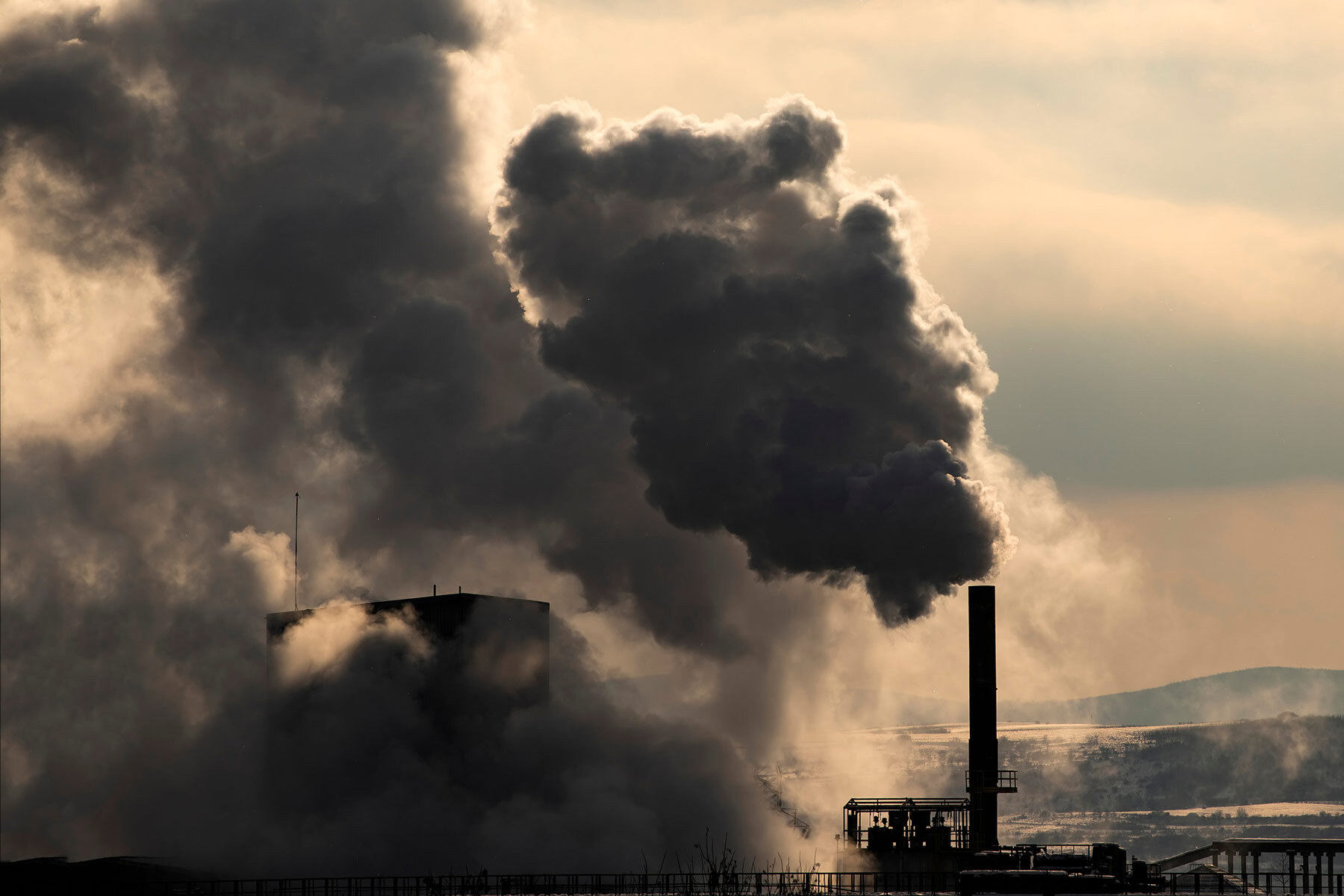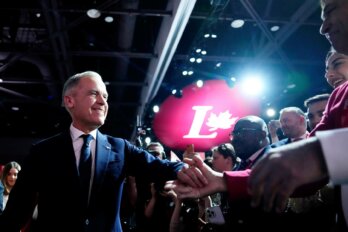The year 2023 was by far the warmest in human history. Climate extremes now routinely shock in their intensity, with a direct monetary cost that borders on the unfathomable. Over $3 trillion (US) in damages to infrastructure, property, agriculture, and human health have already slammed the world economy this century, owing to extreme weather. That number will likely pale in comparison to what is coming. The World Economic Forum, hardly a hotbed of environmental activists, now reports that global damage from climate change will probably cost some $1.7 trillion to $3.1 trillion (US) per year by 2050, with the lion’s share of the damage borne by the poorest countries in the world.
And yet we fiddle.
In today’s Canada, there is deception, national in scope, coming directly from the right‑wing opposition benches in Ottawa. In 2023, the populist Conservative leader Pierre Poilievre adopted “Axe the tax” as his new mantra and has shaped his federal election campaign around that hackneyed rhyme.
The phrase “Axe the tax” offers both good and bad news. The good is that Canada actually has a national carbon tax; the bad is that it is politically vulnerable to being axed. And to a large degree, the responsibility for both circumstances falls to the well‑meaning Liberal federal government.
Soon after ousting Stephen Harper’s Conservatives from power on October 3, 2015, newly elected Liberal prime minister Justin Trudeau announced that his government would establish a national carbon pricing system. He was true to his word: nearly a year later, his “pan‑Canadian approach to pricing carbon pollution” was announced by Catherine McKenna, then minister of environment and climate change. The pending legislation would ensure that all provinces and territories would have carbon pricing in place by 2018. On June 21 of that year, the comprehensive Greenhouse Gas Pollution Pricing Act was proclaimed.
The new national carbon pricing system had two parts: a direct tax on fossil fuel consumption—the “federal fuel charge”—and a blueprint for regulatory trading—the federal Output‑Based Pricing System (OBPS), which was designed primarily for large industrial emitters. Applying to those jurisdictions that did not have pricing systems already in place (unlike BC and Quebec), the national scheme began in 2019 at a modest rate ($20 per tonne of carbon dioxide emitted) scheduled to ramp up $10 annually to $50 per tonne in 2022. Later regulations set an eventual target of $170 per tonne in 2030, equivalent to about forty cents per litre of gasoline. Scheduling that benchmark price to start low and rise over many years was meant to give both industrial emitters and individuals time to adjust to a lower‑carbon‑pollution future.
The OBPS zeroes in on large emitters by granting industries credits to pollute, based on an industry‑specific, performance‑related benchmark. Specific credit limits are fixed, and every tonne of carbon dioxide equivalent emitted beyond the limit is taxed, thus establishing a compelling incentive to emit less. With a nod toward revenue neutrality, federal tax revenues under the OBPS are returned to the jurisdictions of origin, earmarked to support additional emissions reductions as well as the development of cleaner technologies and processes.
It is an accommodating policy that the Canadian Climate Institute suggests is working. Between 2015 and 2030, annual emissions from large‑scale industrial sectors in Canada, like oil and gas, are projected to fall by about a third, compared with a scenario in which no new climate policies are introduced after 2015. The federal fuel charge is projected to cut national emissions by an additional 8 or 9 percent over the same time frame.
But in the fractious world of climate politics, smart policies will succeed only if they are accompanied by political acceptability. There is one feature of the federal legislation that rises above all others in fostering that success: the requirement that almost all tax revenues be returned to taxpayers or the home jurisdictions of industrial emitters. That stipulation became the centrepiece of Trudeau’s scheme. In the context of the federal fuel charge, tax revenues collected are reimbursed directly four times a year in eight provinces and two territories (BC, Quebec, and the Northwest Territories run their own—but federally aligned—schemes). That provision of revenue neutrality is sacrosanct. At present in Canada, about 90 percent of the fuel charge taxes collected is rebated right back into the pockets of taxpayers.
The impact of the rebates is significant. In 2024, a rural family of four in Poilievre’s home province of Alberta, for example, will receive back $2,160, some $700 more than the average family will pay in direct carbon taxes. That average family will receive the same rebate regardless of its energy consumption: if it emits less, it will pay less carbon tax directly and will therefore be even better off.
It’s also fair. Low- or modest‑income families disproportionately benefit from the rebate scheme, and most receive back significantly more than they pay out. It is a brilliant design largely built on British Columbia’s 2008 template developed under then premier Gordon Campbell. It should have come wrapped in political popularity.
Only it didn’t.
The Trudeau government must shoulder much of the responsibility for that failure. Since the inception of the Greenhouse Gas Pollution Pricing Act, the government has neglected to remind Canadians over and over again that they are getting their carbon taxes back. The government lost its way, focusing on the word environment rather than on the phrase that speaks more directly to voters: revenue neutral. Rebates were the hook, the reward for contributing to a better environment by paying an additional tax.
Instead, as reported by Radio‑Canada, for years, direct deposits into householders’ bank accounts were given various nondescript or indecipherable labels like “CANADA FED” or “DN CANADA FED” or “Climate Action Incentive Payments.” According to Shachi Kurl, president of the Angus Reid Institute, polling data collected in late 2023 from across the political spectrum shows “a massive number of Canadians who either believe that they are not receiving a rebate when they are, or don’t know if they’re receiving a rebate or not.” She described the Liberal government’s promotion of one of its flagship policies as “a failure at the most basic level of retail political communication.”
Steps have been taken to repair the damage wrought by poor carbon price marketing: in February, rebate payments—finally!—were labelled “Canada Carbon Rebate.” But such a basic communication imperative is arriving years late. That delay came at a big cost; it opened the door to malfeasant opportunists like Poilievre, giving him the leeway to stand, repeatedly, behind a large sign tacked to his podium: “Axe the Tax / Abolir La Taxe.” There is no footnote on that sign to point out that tax monies are rebated directly to Canadian households.
Worse, Poilievre avoids the gaping hole in his fiscal logic: How would he replace the nearly $12 billion per year that the Canada Revenue Agency currently receives and redistributes through its tax on greenhouse gas emissions? He refuses to answer, instead belittling seasoned press gallery reporters who have the audacity to ask such tough questions, peppering them with condescension.
Poilievre has adroitly sidestepped being held to account. He sits in an information vacuum of his own creation that has left far too many Canadians misguidedly thinking that, somehow, they’ll be in a better financial position if the carbon tax is axed. The opposite is true, but who can blame them for thinking otherwise? Aided in part by a sleepwalking Liberal government, Poilievre has been given nearly free rein to misrepresent Canada’s carbon pricing system.
There are signs that the federal government has finally acknowledged its own deficiencies and pushed back on the outright untruths coming from the Conservatives. On March 17, Jonathan Wilkinson, Canada’s minister of natural resources, responded bluntly: “We do need to do a better job of communicating the affordability dimensions of the price on pollution because it is something that actually makes life more affordable. . . . The facts are clearly that people get more money back. Mr. Poilievre should stop lying to Canadians. He is telling lies on an ongoing basis, and that’s just not something that a responsible leader should be doing.” A day later, in Question Period, Bill Blair, minister of defence, doubled down. “Perhaps it’s time to scrap the crap,” he said.
Repeated often enough, lies have traction. It’s a cynical strategy, but for Poilievre, it appears to be working. His popularity has risen dramatically since mid‑2023. Skilled communicator that he is, he has effectively sold a new narrative, preying on Canadians’ worries about inflation and the high cost of living, verbally linking them to the upward ramp in the carbon price. But analyses of real evidence—hard data from BC and a suite of European jurisdictions—now confirm that his narrative is a false construct. Revenue‑neutral carbon taxation systems do not contribute significantly to inflation. Tiff Macklem, governor of the Bank of Canada, made that clear in September 2023, stating that the $15 per tonne annual increase in the carbon tax would add just 0.15 percent per year to the rate of inflation in Canada. It’s a “relatively small effect,” he said.
Unfortunately, the federal Liberals have repeatedly shot the puck into their own net. The camouflaging of carbon rebate cheques with obscure acronyms was the first own goal. Then, in the late fall of 2023, the prime minister announced that his government would carve out a three‑year‑long federal carbon tax exemption for home heating oil in the Atlantic provinces, a time span that conveniently extended at least a year beyond the likely date of the next federal election. That manoeuvre, designed to curry voter favour in the Maritimes, backfired spectacularly. It immediately put a crack in a foundational element of Canadian carbon pricing: there can be no carve‑outs for specific emitters or regions. Poilievre pounced on Trudeau’s vote‑buying gaffe, writing: “After plummeting in the polls, a flailing, desperate Trudeau is now flipping and flopping on the carbon tax.
Almost immediately, premiers from Ontario and the west demanded that their provinces, too, receive such largesse from the federal Liberals. Sadly lost in the frenzy was the real victim of the Liberals’ self‑immolation: the core concept of revenue neutrality that continues to put about $1,000 annually into the pockets of every taxpaying family in the Maritimes, a subvention that will rise year after year to compensate for the accelerating carbon tax.
Trudeau was wrong not just in granting a carve‑out but in tackling the wrong target. It is the world market, and not the carbon tax, that is driving up the cost of home heating for the many thousands of households in Atlantic Canada still warmed by burning oil. The retail price of a litre of furnace oil in Halifax at the end of December 2019 was $1.05. Nearly three years later, it was an extraordinary $2.27, and by December 2023, down to $1.63. After five years of existence, the carbon tax added only seventeen cents per litre to that price. No, the carbon tax did not cause the affordability problem—the up‑and‑down world oil market did. The prime minister and his team should have taken aim at the real challenge: ridding the Canadian landscape of oil furnaces. They are yesterday’s technology, and they burn yesterday’s fuel.
And what is Poilievre’s position on heat pumps versus oil furnaces? The Conservative Party’s website, as of spring 2024, offered not a word on the party’s carbon pricing positions. And therein lies the nub of the challenge: a large fraction of our current political landscape—a fraction almost entirely conservative—refuses to recognize that revenue‑neutral carbon pricing is intelligent policy.
In March, a cohort of conservative premiers, from Alberta, Saskatchewan, and New Brunswick, met virtually with a parliamentary committee to push for a pause on the scheduled $15 per tonne carbon tax increase scheduled for April 1. Saskatchewan’s Scott Moe was first up. He was particularly concerned with capital investment and productivity growth in his province, stating at one point, without offering any evidence, that “the price on pollution is creating uncertainty in the investment environment in Saskatchewan and Canada.” But carbon tax increases are fully scheduled to 2030. Businesses and individuals factor those rises into their forward‑looking corporate and household budgetary plans. If Moe convinced the federal government to forgo the long‑scheduled carbon tax increase, he would be a primary agent in creating the very uncertainty he was decrying.
Alberta’s Danielle Smith launched into an attack on the carbon tax generally: “This isn’t just reckless, it’s immoral and it’s inhumane,” she said. “The added pressure will ruin countless lives, futures, and dreams. It’s a weight that Canadians can’t bear. And that’s why Alberta has been calling on the federal government to eliminate the carbon tax since 2019.”
In questioning from committee members, Liberal MPs focused on Smith’s duplicity. She was hoist on her own petard by Ontario MP Irek Kusmierczyk when he asked her how she justified railing against the pending three‑cent jump in the federal fuel charge on gasoline when her own provincial budget, set to land on the same day, April 1, was scheduled to increase the provincial tax on gasoline by four cents a litre. Smith responded with a word salad, mentioning buzzwords like “home heating oil,” “inflation crisis,” and “building roads” but failing to address her hypocrisy.
The conservative premiers that week simply refused to acknowledge the central importance of revenue neutrality as a key to successful carbon pricing. They refused to acknowledge that the Canadian system is fundamentally a smart tax shift that benefits the economy and helps to drive emissions downward. In refusing to recognize that simple fact, they promise to take us backward in confronting global warming. And that is immoral and inhumane.
Wise leadership matters—leadership guided by history, science, economic experience, and example. Now more than ever, Canadians need to be reminded of that. Families in Canada sacrifice by paying a carbon tax, but they are rewarded when they get much of their outlay—or more—back while directly contributing to climatic responsibility. That contribution is an outcome worth celebrating.
Adapted and excerpted from The Carbon Tax Question: Clarifying Canada’s Most Consequential Policy Debate by Thomas F. Pedersen, 2024, published by Harbour Publishing Ltd. Reprinted with permission from the publisher.





